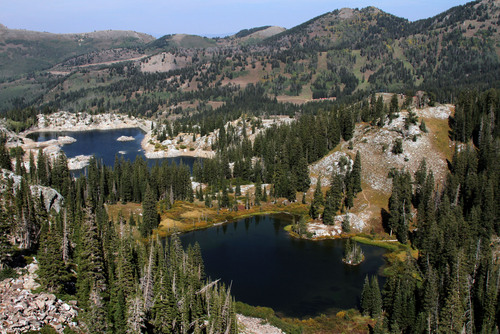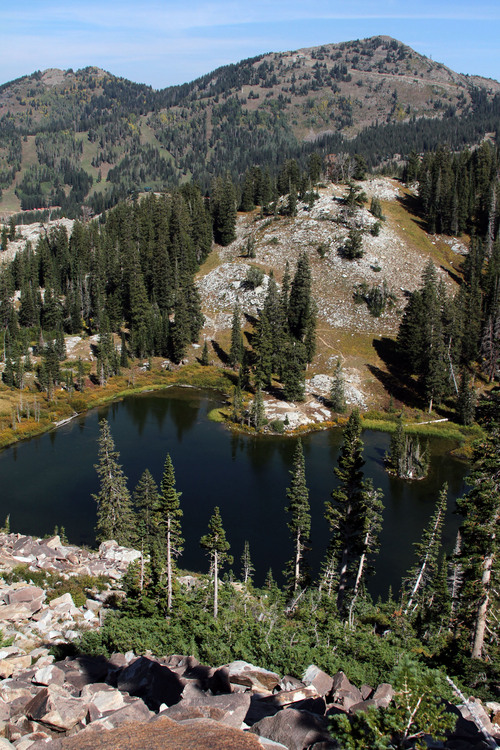This is an archived article that was published on sltrib.com in 2013, and information in the article may be outdated. It is provided only for personal research purposes and may not be reprinted.
Salt Lake City clearly prevailed in a lawsuit challenging its ownership of land beneath Lake Martha, a reservoir in upper Big Cottonwood Canyon that stores drinking water for valley residents.
But its adversary in the litigation, a company called Great Western Mining that owns another 350 acres of land and 1,500 acres of subsurface mineral rights in the mountains above Brighton, also said it was pleased by the outcome.
"To get these properties into the public hands, we had to define ownership," said Preston Truman, of Salt Lake City, a Great Western Mining owner. "That has been accomplished and we can move forward to get the property sold."
Great Western Mining would like to sell its land and mineral rights to the nonprofit Wasatch Canyons Foundation, which then would transfer those rights to the U.S. Forest Service or the state Department of Natural Resources, public agencies that manage the mountainous terrain.
"It's a great plan, with huge implications for conservation and watershed protection," Truman said, because it moves parcels to experienced land-management agencies while providing private-property owners with compensation for lands they cannot use because of their environmental sensitivity.
Wasatch Canyons Foundation Vice President Woody Noxon said his group hopes to launch a campaign this fall to secure money from individuals, other nonprofits and companies attending the twice yearly Outdoor Retailer trade shows to purchase those private inholdings.
Another group affiliated with this project, My Convention Housing, is giving the foundation some of its proceeds from renting University of Utah dorm rooms in July to people attending the Outdoor Retailer Summer Market.
"The objective is to provide an environment for our grandkids and to preserve the wonderful forest — it's that simple," Noxon said. "I compliment the two parties for coming to a resolution, providing a long-term benefit for the people, the city and the county."
A little more than a year ago, Great Western Mining filed suit in 3rd District Court, asserting ownership to four patented mining claims above Brighton. One underlies much of Lake Martha.
But Judge Keith Kelly ruled Salt Lake City had a valid 1908 deed to the surface estate of the four parcels. Kelly dismissed the mining company's suit, but left in place a city countersuit alleging the company had slandered its title by falsely claiming to own the property.
That part of the case was entering the expensive process of discovery when the two sides settled earlier this month. Salt Lake City dropped the slander allegation after Great Western Mining offered the city the mineral rights beneath the four parcels.
"We won," declared Jeff Niermeyer, director of the city's department of public utilities, which is responsible for protecting the Wasatch Mountain watershed that helps provide drinking water to Salt Lake City and much of the valley's east bench. "They gave us a quit-claim deed for any interest in the subsurface claims and we called it good."
The company and the Wasatch Canyons Foundation hope the settlement reduces city resistance to their plan to transfer Great Western's holdings to the Forest Service and state parks system.
"It eliminates misunderstandings and an issue that has been around for years," Noxon said. "Now we can move ahead to transferring the property over time."
The foundation invited Salt Lake City to have a representative at its meetings, where details about the land transfers will be worked out.
But the city declined, said Niermeyer, who was indignant when Great Western Mining filed its lawsuit last year, characterizing it as an attempted land grab.
"We're not involved in that [land transfer] process and don't intend to be," he said. "We have a fair amount of concern about how this whole thing is being approached so we decided to stay out it."
But the settlement drew praise from John Bennett, staff member to the state's Quality Growth Commission.
"Conservation is always better when you have people who agree to it rather than trying to do it by court action," he said. "We need willing buyers and willing sellers for conservation to go forward."
The foundation's approach makes sense, Bennett added. "It's all private money [from] people who are interested in conserving that area and are willing to step up and put a little skin in the game themselves."
Cathy Kahlow, the Forest Service's Salt Lake District ranger, has watched this legal battle closely from the fringes. Now she's waiting to see what the foundation comes up with for transferring lands to her agency.
"I'm just really pleased to see everybody is working toward a common goal with land stewardship," she said.
Twitter: @sltribmikeg —
Great Western Mining
The land and mineral rights Great Western Mining would like to sell for transfer to public lands agencies include:
68 acres in upper Big Cottonwood Canyon.
76 acres in Little Cottonwood Canyon's Albion Basin.
69 acres around Catherine Pass between Little Cottonwood and Big Cottonwood canyons.
82 acres in Snake Creek Canyon (Wasatch County).
70 acres in American Fork Canyon in Utah County.





